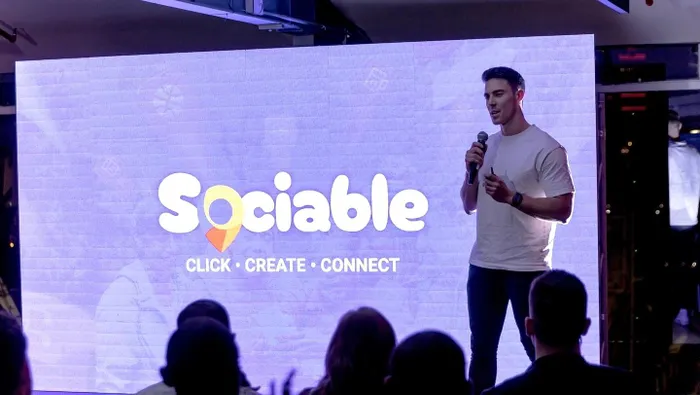
Sociable app co-founder, Jason van Dyk, delivers his keynote address at StartUp Club ZA Cape Town Showcase
Image: Sociable
In an age where digital fatigue is the norm and isolation a creeping epidemic, a South African-born app is striking a powerful counterbalance.
The Sociable App, launched in Durban in late 2022, is quickly becoming the go-to platform for people craving real-world connection, community, and meaningful experiences, not just more screen time.
From artists and entrepreneurs to students and fitness trainers, over 16,500 users across the country have embraced Sociable’s premise: that being together should feel effortless.
Whether it’s hosting a micro-event or finding a spontaneous night out nearby, Sociable says it simplifies the way people meet, plan, and engage in real life.
“At a time when everyone is focusing on making life simpler, we aspired to build a platform that made life more meaningful,” says Jason van Dyk, founder of Sociable, told Fast Company.
“To use innovation, not to find new covert ways to sell a product, but instead to take the approach of adding back. Adding back adventure, adding back passion, adding back community,” he explained.
Sociable’s appeal lies in how it merges the convenience of tech with the authenticity of human connection.
Users can effortlessly browse real-time events, host their gatherings with in-app customisation tools, and even build and manage their micro-communities, all without the bloated distractions of traditional social media.
“We’ve built the platform to be an ecosystem, not a transactional marketplace,” van Dyk noted.
“Every feature is created to make it easier to bring people together, from native access management to weather reports for your events.”
The app’s clean interface and map-based discovery feed help users find experiences by category or location. At the same time, hosts can coordinate multi-tier ticketing, RSVPs, and community messaging, all within a single platform.
Sociable’s growth has been anything but accidental. Eschewing heavy ad spend, the team focused on grassroots partnerships with local creators, community leaders, and event organisers in cities like Durban, Cape Town, and Johannesburg.
“Sociable remains the only locally-created social connection platform with this kind of growth trajectory from inception to date,” van Dyk said. “Our grassroots-first growth strategy is what allowed us to connect deeply with communities, not just grow vanity metrics.”
This strategy has paid off. The app has hit number 7 on the South African App Store, boasts a 4.9-star rating, and enjoys strong uptake, particularly in Cape Town, where the company is headquartered.
Gauteng is next in line for expansion.
Research shows that one in four young adults experiences persistent loneliness. While traditional social media platforms promised connection, many users feel more isolated than ever in the algorithmic noise. Sociable said it answers those frustrations head-on.
“We’re seeing especially strong momentum among women-led and women-only communities,” van Dyk noted.
“It’s incredibly rewarding to see how Sociable is being used as a tool for empowerment and safe community building in those spaces.”
The app’s features reflect this human-first approach, focusing on autonomy, safety, and inclusivity, values rarely prioritised by global tech giants.
Behind the scenes, Sociable is working on a new, still-unannounced feature that van Dyk claimed “will completely change how communities are supported.”
Though tight-lipped on the details, he hinted at a major shift in how digital tools can support the intention economy, where users don’t just scroll, they engage with purpose.
While the company remains private and cautious about financials, van Dyk confirmed that Sociable is open to strategic partnerships and mission-aligned investment as it scales.
“We are always looking for new ways to align and partner with people who share our vision, whether that’s through operations, investment, or collaborative innovation,” he said.
“If someone sees the trend toward in-person connection and wants to build the intention economy, we’d love to see how we could work together.”
Looking ahead, the team has global ambitions.
“The need for community is not isolated to one city, country or continent. It’s a foundational human desire,” van Dyk said. “In five years, we hope to bring Sociable to the global stage, and to be leading the market swing back to human-centric innovation.”
BUSINESS REPORT